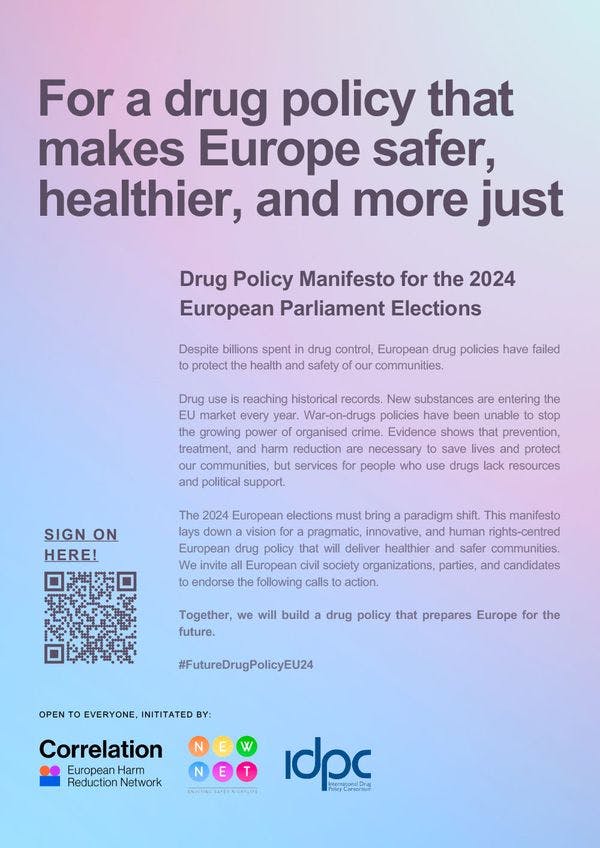For a drug policy that makes Europe safer, healthier, and more just - Drug policy manifesto for the 2024 European Parliament elections
Despite billions spent in drug control, European drug policies have failed to protect the health and safety of our communities.
Drug use is reaching historical records. New substances are entering the EU market every year. War-on-drugs policies have been unable to stop the growing power of organised crime. Evidence shows that prevention, treatment, and harm reduction are necessary to save lives and protect our communities, but services for people who use drugs lack resources and political support.
The 2024 European elections must bring a paradigm shift. This manifesto lays down a vision for a pragmatic, innovative, and human rights-centred European drug policy that will deliver healthier and safer communities. We invite all European civil society organizations, parties, and candidates to endorse the following calls to action.
Together, we will build a drug policy that prepares Europe for the future.
#FutureDrugPolicyEU24
Open To Everyone, Initiated by Correlation – European Harm Reduction Network, the International Drug Policy Consortium (IDPC), NEWNet Enjoying Safer Nightlife.
The Principle of the Drug Policy Manifesto:
Ramp up investment in health and social care
Drug use in Europe is at record levels, and the growing presence of new psychoactive substances, including synthetic opioids, has raised the alarm. Law enforcement and drug control will not stop this new threat, just as they have failed in other regions of the world. To be prepared for the future, the EU institutions must prioritise support and funding for integrated health and care services that are proven to work. A focus on services that support, rather than punish, people who use drugs is necessary to save lives and keep communities safe.
EU drug policy must be rebalanced, ending the current prioritisation of law enforcement over health. The EU institutions must ramp up investment and support for selective and indicated prevention programmes, evidence-informed voluntary treatment, life-saving harm reduction (including HIV/AIDS and HCV prevention, opioid assisted treatment, take-home naloxone, drug checking services, and drug consumption rooms), and community-based and community-led services that can reach out to everyone in need.
Abandon war-on-drugs policies
It is time to abandon war-on-drugs policies that, despite costing billions, have failed to reduce the size of illegal drug markets, to curb the power of organised crime or to reduce violence. Policies and narratives that stigmatise and blame people who use drugs and marginalised communities must be replaced with interventions grounded in evidence, inclusion, and human rights.
To ensure an integrated, holistic, and intersectional approach to drugs, EU health bodies must have a pivotal role in shaping EU drug policy. Drug policy must be mainstreamed across social, health and economic policies, and not be left at the hands of law enforcement alone.
The EU institutions must mainstream an inclusive, human rights and gender-based approach to drugs, including an unequivocal support for the decriminalisation of people who use drugs as a measure to remove stigma and improve access to services.
The new EU Drugs Agency must create indicators that monitor the effectiveness and impact of current drug policy approaches such as crime prevention and demand and harm reduction, including on stigma, access to services, and human rights, and conduct more policy-oriented research. EU bodies mandated to uphold human rights, EU values and the rule of law must also be involved.
Ensure civil society and community participation
A safer and more effective drug policy requires the involvement of civil society organizations that work every day with communities, can reach out to vulnerable populations, and are best informed of new trends in drug markets. EU drug policy must reflect the principle ‘nothing about us without us’, involving first and foremost affected communities and people who use drugs.
Mechanisms for civil society participation in EU drug policy, including the Civil Society Forum on Drugs in the EU, should be appropriately funded, supported, and meaningfully consulted by the European Commission, the EU Drugs Agency, and all relevant EU institutions. They should include representatives of affected communities, including people who use drugs, young people, women, and those disproportionately affected by criminalisation, stigma, and discrimination.
Explore innovative approaches, including responsible regulation
A pragmatic drug policy requires exploring innovative approaches to drug markets, including the responsible regulation of drugs such as cannabis, as a key measure to protect the health and human rights of communities, and reduce the power of organized crime. The EU should facilitate these innovations, and monitor their impact on health, safety, and human rights.
European policy makers must ensure that European laws and policies facilitate the adoption of innovative approaches to drug markets, including responsible regulation. The EU Drugs Agency should monitor the impact of drug policies and regulation, to allow for evidence-informed policy making. This will support mutual learning, increase uptake of best practices, contribute to pragmatic solutions, and prepare Europe for the future.
Signatories
- Adpd Green Party Malta
- AIDES
- Alcohol- en drugscoach
- Alliance Nationale des Communauté pour la Santé (ANCS)
- Alternation Association
- ARAS - Romanian Association Against AIDS
- Asociace poskytovatelů adiktologických služeb, z.s.
- Association for Humane Drug Policy
- Association SKUC
- CASO
- Citywide Drugs Crisis Campaign
- Correlation European Harm Reduction Network (C-EHRN)
- Društvo SVIT, Koper
- Episteme - Investigació i Intervenció Social
- Forum Prävention - streetlife.bz
- Global Commission on Drug Policy
- Harm Reduction Malta
- Help Not Harm
- International Drug Policy Consortium (IDPC)
- koje | taktisch klug
- Kosmicare
- L’ Isola di Arran
- Lab57 - Alchemica, Bologna
- Legalize NL
- Matthildur - harm reduction organization
- NADIR ETS
- NewNET
- Parsec NGO
- PRAKSIS
- Projet Lama centre psycho-médico-social
- Psycare UK
- Recovering Nepal
- RefletsduReel (RdR) - Asud auto-support usagers de drogues
- Safer Youth
